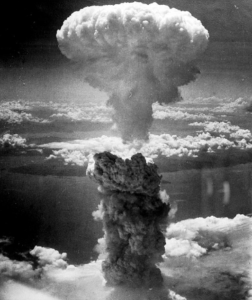![]()
When the world came together to sign the Nuclear Nonproliferation Treaty (NPT) in 1968, there was a cautioned optimism that perhaps the fears of rampant proliferation were things of the past. Only three countries – Pakistan, India and Israel – refused to sign the treaty, with all others pledging to either not distribute sensitive nuclear assistance if they had nuclear weapons or to not pursue nuclear weapons if they were not recognized nuclear states. Outside of the rogue state of North Korea and the apartheid regime in South Africa, no state has pursued nuclear weapons. In fact, following the Soviet Union’s collapse, former satellite states turned over their weapons.
Recently, questions have arisen regarding the continuity of this long standing norm. In a routine inspection last month, the IAEA discovered the Iranians had enriched Uranium up to 84 percent, a number that is dangerously close to the 90 percent enrichment threshold commonly referred to as weapon’s grade Uranium. Nuclear security experts concur that once a country can enrich to levels as high as 84%, getting to 90% is almost a walk in the park.
Therefore, the nonproliferation norm the United States has ardently upheld once again was breached, raising the serious question of what is next for nuclear proliferation and global security. Will Iran’s probable acquisition of nuclear weapons radically alter national security?
For global security and stability, nearly the entire world agreed in the NPT to prevent nuclear proliferation to the fullest extent possible. Throughout the Cold War, the United States and Soviet Union worked almost hand-in-hand ensuring that no signatory country besides the five recognized nuclear-weapon states (United States, Soviet Union, United Kingdom, France and China) obtained nuclear weapons, often acting severely against their own allies that began nuclear armament programs. The United States fiercely threatened Taiwan and South Korea when their nuclear programs were discovered and no member of the Warsaw Pact built nuclear weapons.
However, this bipolar nonproliferation effort ended with the collapse of the Soviet Union, leaving the United States as the sole global enforcer of nonproliferation. The United States failed to prevent North Korea from obtaining nuclear arms and it now appears that Iran will soon have the ultimate weapon. By any conceivable metric, the United States has failed to enforce nonproliferation.
On the contrary, this does not mean that the United States should settle back and allow rampant proliferation. In fact, quite the opposite is true. A nuclear-armed Iran will tempt many Middle Eastern countries, especially Saudi Arabia, the UAE and Turkey, with developing domestic nuclear armaments programs. The United States must stand by its defense of nonproliferation and prevent any other country from obtaining nuclear weapons, even if that country is an ally or partner.
More nuclear weapons will lead to a more unstable world; therefore, the United States must not only be prepared to act, but it should be prepared to employ the same sanction mechanisms that were almost effective against Iran. Even though Saudi Arabia and the UAE are considered allies of the U.S., this does not in any way mean that the U.S. should not levy harsh sanctions if they begin exploring the domestic production of nuclear weapons. This policy should remain global too; beyond the Middle East, other countries that face aggressive neighbors must also be deterred from pursuing nuclear weapons.
It is up for debate whether Iran’s development of the bomb will serve as a catalyst for more international instability or be contained and lead to no major spillover. While trends in international security would point towards more instability considering Russia’s ongoing war in Ukraine and China’s aggressive posturing against Taiwan, the future is yet to be determined. With another nuclear-armed state and aggressive rival powers, the next decade looks unstable, but the United States and its allies must communicate that they are ready for the challenges that are on the horizon.
It is encouraging that Russia’s invasion of Ukraine has revitalized NATO, pushing even the recalcitrant Germans and French to invest heavily into the modernization and proper armament of their militaries. Furthermore, Iranian and Chinese belligerency will motivate more countries to partner with the United States and the West. There are now too many challenges to global peace for the United States to operate unilaterally; fortunately, those days are also in the past. In several years, European militaries will once again be capable of conducting large-scale operations away from their shores and deterrent threats by NATO will have to be taken seriously. Iran’s acquisition of the ultimate weapon may turn out to be not a catalyst for instability but for a global partnership that seeks to combat revisionism and prevent any more proliferation or brutal conquest.













